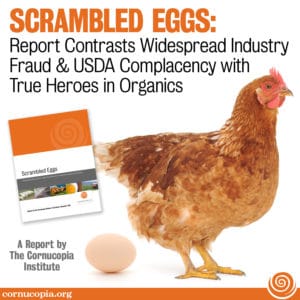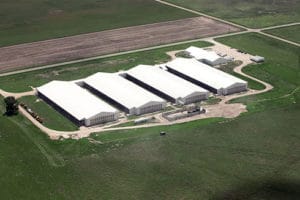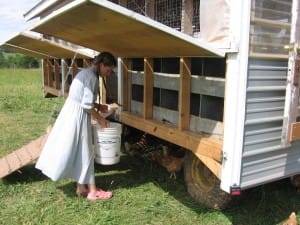Lobbyists Conspired to Confine Chickens to Factory Farms
Consumers Fight Back through Marketplace Activism
 Reacting to the close of a 90-day public comment period on July 13, the nation’s preeminent organic industry watchdog harshly criticized the USDA for what they called a “giveaway” to factory farm interests masquerading as organic. The Cornucopia Institute suggested that consumers reaffirm their support for organic family-scale farmers by “taking the law into their own hands” and seeking out truly authentic organic eggs, produced humanely.
Reacting to the close of a 90-day public comment period on July 13, the nation’s preeminent organic industry watchdog harshly criticized the USDA for what they called a “giveaway” to factory farm interests masquerading as organic. The Cornucopia Institute suggested that consumers reaffirm their support for organic family-scale farmers by “taking the law into their own hands” and seeking out truly authentic organic eggs, produced humanely.
The rule elicited comments from over 5,000 citizens, lobbyists and organic stakeholders. The animal welfare rule has been one of the most prominent controversies in the history of the organic movement, sparked by USDA inaction that allows as many as two million “organic” birds to be confined on giant concentrated animal feeding operations (CAFOs). Advocates assert that federal law clearly requires “access to the outdoors.”
Cornucopia policy experts and scientists claim that the options presented in the USDA’s draft rule could confine birds to as little as one square foot indoors and only require farms to provide two square feet of “pasture” outdoors, half of which could be covered with concrete.
“At best, the USDA proposal delays enforcement for five to seven years allowing continued factory farm confinement production,” states Mark A. Kastel, Senior Farm Policy Analyst for The Cornucopia Institute. “Families, with growing children to feed, can’t wait that long for nutritionally superior food, and more and more are seeking out the guidance provided in our Scrambled Eggs report and scorecard — separating phony industrial production from truly exemplary organic eggs.”
The timing of this controversy is ironic, just as Americans are reacting to new medical literature encouraging the consumption of “healthy” fats, including eggs.
Cornucopia’s Scrambled Eggs report and organic egg brand scorecard profile exemplary management practices employed by many family-scale organic farmers engaged in egg production, while spotlighting abuses at so-called “factory farms,” some confining hundreds of thousands of chickens in industrial buildings and representing these eggs to consumers as “organic.”
Cornucopia’s study incorporates six years of research into organic egg production. The report is accompanied by an online scorecard rating various organic brands on how their eggs are produced in accordance with federal organic standards and consumer expectations.
The Wisconsin-based farm policy research group has accused the USDA’s National Organic Program of gross malfeasance in neglecting to protect consumers from fraud and ethical farmers from unfair competition, as Congress charged the agency to do.
Cornucopia has filed a series of lawsuits accusing the USDA of illegally rigging the rulemaking and enforcement process and violating the Freedom of Information Act (FOIA) in order to cover up the improprieties.
“For our egg industry report, we have visited or surveilled, via aerial photography/satellite imagery, a large percentage of certified organic egg production in the United States, and surveyed all name-brand and private-label industry marketers,” said Kastel,. “It’s obvious that a high percentage of the organic eggs on the market are illegal and should, at best, be labeled ‘produced with organic feed,’ rather than bearing the USDA-certified organic logo,” Kastel stated.
 |
was acquired by the agribusiness giant Cal-Maine. |
According to industry lobby group the United Egg Producers (UEP), 80% of all organic eggs are produced by just a handful of UEP’s largest members. Most of these operations own hundreds of thousands, or even millions, of birds and have diversified into “specialty eggs,” which include organic.
These giant industrial producers, and UEP, in their comments to the USDA, are fighting against any enforcement of the current regulations requiring birds to be outdoors on soil and grass.
In contrast, consumers, in their comments, have articulated concerns about the humane treatment of animals, and are simultaneously seeking out eggs that are superior in flavor and nutrition, a number of national marketers have found success in distributing “pasture” produced eggs.
Cornucopia’s report focuses not on the size of some of the mammoth agribusinesses but rather on their organic livestock management practices. It says that most of these giant henhouses, some holding approximately 200,000 birds, provide no legitimate access to the outdoors, as required in the federal organic regulations.
The new report comes at a critical juncture, as the years-long debate over the animal welfare rules past into a new phase with the close of the opportunity for public comment. After failing to persuade the USDA to investigate alleged illegalities (i.e., confinement of animals without outdoor access) on numerous “organic” CAFOs, Cornucopia contracted for aerial photography of a number of the nation’s largest organic egg operations. Without even conducting an investigation, the USDA closed Cornucopia’s formal legal complaints in 2015, that were backed up, in addition to photographic evidence, with state regulatory documents.
“These industrial-scale operators are gaming the system, by providing tiny enclosed porches, with roofs and concrete or wood flooring, and calling these structures ‘the outdoors,’” stated Kestrel Burcham, a livestock policy analyst with Cornucopia. “The porches that companies are defending in their comments represent just 3% to 5% of the square footage of the main building housing the birds. That means 95% or more of the birds have absolutely no access whatsoever to the outdoors,” Burcham explained.
“If one animal has the legal right to be outdoors, then all animals have the same right, whether they take turns or if they all choose to be outside at the same time,” said Jim Riddle, a Minnesota organic farmer and former chairman of the USDA’s National Organic Standards Board (NOSB).
In an additional effort to legally compel the USDA to act, Cornucopia has filed formal complaints against several of the independent organic certifiers, working under USDA supervision, and the poultry companies that either offer their birds no access to the outdoors or “faux” outdoor access — the small enclosed porches. These complaints have now languished ten months since they were filed, with no response yet from the USDA.
After visiting scores of egg producers in 11 states, the authors of the Cornucopia report also conclude that the vast majority of family-scale producers are at least complying with minimal organic regulations. “This is the good news in this report,” explained Kastel. “Now the USDA needs to step up and protect ethical organic farmers from unfair and illegal competition — the proposed multiple year phase-in, by the agency, is inexcusable.”
“An important subset of organic farmers even go far beyond the minimum requirements in the organic standards: not just providing access to the outdoors but rotating birds on high-quality pasture,” affirmed Burcham.
The report identifies producers, and their brands, that Cornucopia describes as “the gold standard”: those with mobile chicken coops rotated frequently on pasture. Some, like World’s Best Eggs in Texas, with 24,000 birds in 49 movable henhouses, are proving they can scale-up the model without diminishing the integrity.
“When consumers buy our eggs they are willing to pay a premium because they know the birds are out on pasture, enjoying fresh air, running around, foraging in the pasture,” said Cameron Molberg, a Texas farmer who also operates the state’s only certified organic feed mill. “These are real organic eggs,” Molberg added.
Molberg notes that they have expanded to meet the market demand of larger retailers, selling their eggs to Whole Foods stores in Texas, as well as Natural Grocers and independent retailers. The brand has earned the top “five-egg” rating on Cornucopia’s organic egg scorecard.
Laying hens living on pasture-based farms tend to be under less stress, due to their greater opportunity to exercise and ability to engage in instinctive foraging behaviors that lessen aggression toward their flock mates. Pastured hens also frequently live longer productive lives instead of the one-year that is common on industrial-scale farms.
Another high-integrity organic egg producer is a group of 10 Mennonite farm families in Virginia. One of their producers told Cornucopia researchers, “Our hens are healthy, live longer, and produce better-tasting and more nutritious eggs. How can you go wrong with pasturing?” The group markets their eggs under the Shenandoah Family Farms brand, available at Whole Foods stores and co-op grocers in the Washington, D.C. area.
 |
Mennonite families that work together to market truly pastured eggs. |
Organic customers are also increasingly aware of a growing body of scientific literature confirming the nutritional superiority of eggs when the birds have an opportunity to eat fresh forage, seeds, worms, and insects.
“Part of our intent, and the basis of this research and report, is to protect the livelihoods of family-scale organic farmers,” said Dr. Linley Dixon, a Cornucopia policy analyst. “These farmers are being placed at a distinct competitive disadvantage by corporations that are more than willing to ignore the rules and cut corners in pursuit of profit,” she said.
One producer whose pastured poultry operation was squeezed out of business is Ivan Martin, of Natural Acres in Millersburg, Pennsylvania. He told Cornucopia researchers during their site visit, “Consumers saw my [legally produced] eggs next to other so-called organic eggs bearing the exact same USDA Organic label, and probably thought they were equivalent in terms of outdoor access and nutrition. We could not compete with those [factory farm] eggs,” said Martin.
“Until the USDA decides to enforce the law, consumers and wholesale buyers can be empowered in their purchasing decisions by accessing Cornucopia’s Scrambled Eggs report and the organic egg brand scorecard,” said Kastel. Both can be viewed at www.cornucopia.org.
MORE:
“The pending draft rule, requiring only 1 ft.² outdoors on soil or vegetation, is a joke and an insult to consumers and farmers practicing true organic methods,” said Kastel.
Cornucopia notes that probably the biggest name-brand organic egg purveyor, the farmer-owned cooperative Organic Valley, requires five square feet outdoors for their birds. European organic regulations require 43 square feet per bird. Companies rated at the top of Cornucopia’s scorecard, certified by the leading humane organizations, are affording “Enhanced Outdoor Access” for their birds, with 108 square feet per hen. And many are providing substantially more than that.

